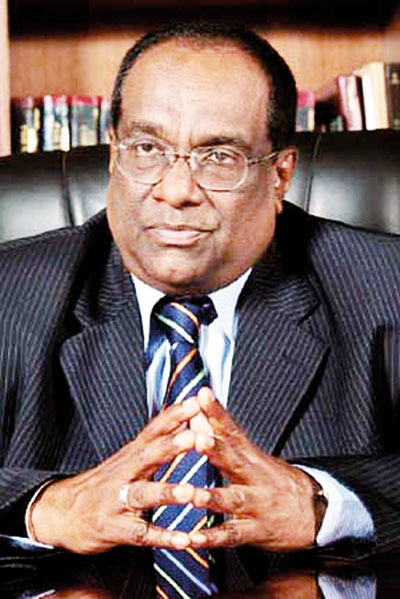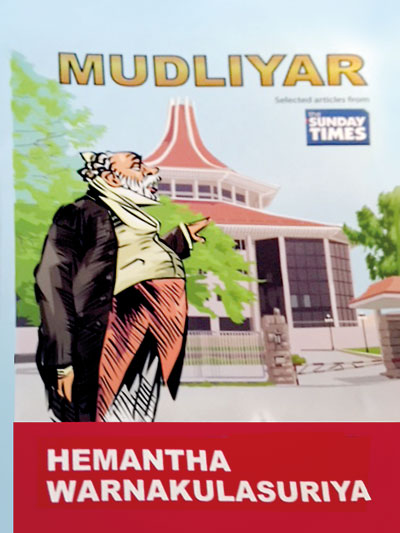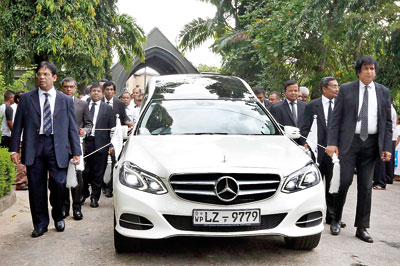News
ST’s ‘Mudliyar’ and legal luminary Hemantha Warnakulasuriya passes away
View(s):Senior criminal lawyer Hemantha Warnakulasuriya PC passed away at the age of 74 this week after a brief illness, and was cremated yesterday at the Colombo General Cemetery, in the presence of a large gathering of lawyers, politicians, artistes and friends.
Mr. Warnakulasuriya wore many hats in his lifetime. He was a criminal lawyer with a wide practice in the original courts, a writer courting controversy at times, but unafraid to take a position, and a diplomat who served as Sri Lanka’s ambassador to Italy.

Hemantha Warnakulasuriya
He was receiving treatment at a private hospital when he passed away on Monday night.
Born on September 24, 1944, he had his education at Royal College, Colombo, and later graduated from the Sri Lanka Law College, taking his oaths in 1974.
He was soon a frontline spokesman of the Bar Association of Sri Lanka (BASL) and pioneered the opening of the Legal Aid Centres island-wide. He also started the “Nithi-Neethi “, a seminar programme for junior and senior lawyers, as well as a pension scheme for BASL members. He also pioneered the inaugural issue of the Sri Lanka Lawyers’ Directory.
Mr. Warnakulasuriya was the Chairman of the Legal Aid Foundation of the BASL (2004-2005), Deputy President of the BASL (2004-2005) and Secretary of the BASL (1989-1991). He appeared in several challenging cases, among which was the Wijedasa Liyanaarachchi murder case, where a JVP activist was killed in police custody.
He also appeared as one of the Counsel for the Sunday Times in the criminal defamation case filed by then President Chandrika Kumaratunga, and later wrote a popular column to this newspaper titled ‘Hulftsdorp Hill’, under the pseudonym ‘Mudliyar’. It was all about contemporary happenings in the country’s Courts of Law. That it ruffled a few feathers in the higher echelons of the Judiciary at the time was to be expected.
Selected articles of this weekly column were later published in a book. The publisher of the Sunday Times wrote, “Sometime in the 1990s, an old friend and very much a concerned citizen whose opinion I value, and continue to value, said to me, “Aren’t you sailing close to the wind?”. I had to seek an explanation to the nautical term and also why he dropped those words of caution. “Aren’t you reading ‘Mudliyar’ in the Times?”, he asked. I had to confess, “no”, I had only occasionally glanced at the ‘Mudliyar’ column. He raised an expressive eyebrow, but said no more. I commenced reading the ‘Mudliyar’s’ weekly contribution with care, from that week. It was a riveting and often nail-biting experience. A publisher’s caution is sometimes at cross-purposes, with what an intrepid editor wants for the newspaper from a columnist who tells it as it is.

Selected columns he wrote for the Sunday Times were published in a book
“So some red jottings were made. There was more agony, thinking of what official retribution could happen in the week to follow and, on the other hand, whether both editor and columnist would say “the hell with it” and stop the column which, by then, I believed to be a valuable weekly comment on our Legal experience and administration of Justice, and, therefore, also to what extent Democracy was functional”.
The foreword to the book said, “Mr Hemantha Warnakulasuriya PC knows HULFTSDORP HILL and its particular workings only too well… he peered inside the veil of secrecy shrouding those hallowed precincts and brought the happenings there to the public domain. And so, the citizenry became acquainted and gained a greater understanding of the way the Temples of Justice functioned.
The foreword added that, “not surprisingly, he rode on thin ice, as he wrote with a flourish and a style all his own… he wrote on the hapless litigant, of legal fees, court records, provincial courts and the like, and also of grandstanding Justice Ministers, upright Judges and downright obnoxious ones, egalitarian State Prosecutors, witty clients and the pernicious administration of Justice at a particularly critical moment in the country’s contemporary history”.
Mr. Warnakulasuriya had several juniors who ‘devilled’ in his chambers and went on to become successful practitioners themselves while some adorned the Bench as judges. At the time of his death, he was a Director of the Telecommunication Regulatory Authority (TRC).
He leaves behind his wife, Iranganie and two children, Sahan and Mihiri, and son-in-law Buddhika Pathirana, Deputy Minister of Commerce and Industry.

Chief Justice Priyasath Dep and Solicitor General Dappula de Livera lead the pall-bearers that comprised former Presidents of the BASL at yesterday's funeral of Hemantha Warnakulasuriya, PC. Several orations were made and condolence messages from leaders of political parties read out. Sarath Kongahage, Adviser to President Maithripala Sirisena spoke on behalf of the late Mr. Warnakulasuriya’s family. Pic by Nilan Maligaspe

